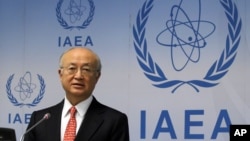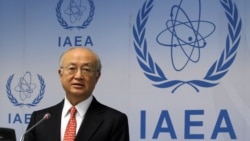The Director General of the International Atomic Energy Agency, the IAEA, reports that Iran has made progress on steps it agreed to take concerning its nuclear program. A series of steps was laid out in the Joint Plan of Action that Iran and the P5+1 countries, in coordination with the European Union, agreed to in November.
Yukiya Amano told the IAEA Board of Governors during the Board’s March meeting in Vienna that Iran was implementing the steps “as planned,” including the dilution of half of its stockpile of 20 percent enriched uranium. “The measures implemented by Iran, and the further commitments it has undertaken, represent a positive step forward; but much remains to be done to resolve all outstanding issues,” he said. In particular, Mr. Amano cited the need for “clarification of all issues related to possible military dimensions.”
U.S. Ambassador to the IAEA Joseph Macmanus welcomed the Director General’s confirmation that Iran is continuing to fulfill its commitments under the Joint Plan of Action, and is starting to address some of the most urgent concerns regarding its nuclear program. In his statement to the Board of Governors, he noted, for example, that Iran has halted uranium enrichment activities above 5 percent; it is taking steps to eliminate its stockpile of near 20 percent low enriched uranium hexafluoride; it has not installed any new components at the IR-40 heavy water reactor at Arak, and has not manufactured or tested additional IR-40 fuel since January 20.
The Joint Plan of Action, Ambassador Macmanus said, “has given us time and space to pursue a diplomatic resolution with Iran.” The last round of talks in February between the P5+1 countries and Iran were productive, he said, and helped clarify the framework for deliberations going forward –- deliberations that are aimed at achieving a long-term comprehensive solution to the nuclear issue. The next round of talks at the political director level is scheduled for March 17 in Vienna.
Ambassador Macmanus urged the Iranian government, however, to cooperate fully with the IAEA to address all outstanding issues, in particular those related to possible military dimensions, “substantively and without delay.”
“Only with Iran’s complete and full cooperation,” said Ambassador Macmanus, “will the IAEA be able to verify the exclusively peaceful nature of Iran’s nuclear program, which remains central to the efforts to achieve a long-term comprehensive solution.”
Yukiya Amano told the IAEA Board of Governors during the Board’s March meeting in Vienna that Iran was implementing the steps “as planned,” including the dilution of half of its stockpile of 20 percent enriched uranium. “The measures implemented by Iran, and the further commitments it has undertaken, represent a positive step forward; but much remains to be done to resolve all outstanding issues,” he said. In particular, Mr. Amano cited the need for “clarification of all issues related to possible military dimensions.”
U.S. Ambassador to the IAEA Joseph Macmanus welcomed the Director General’s confirmation that Iran is continuing to fulfill its commitments under the Joint Plan of Action, and is starting to address some of the most urgent concerns regarding its nuclear program. In his statement to the Board of Governors, he noted, for example, that Iran has halted uranium enrichment activities above 5 percent; it is taking steps to eliminate its stockpile of near 20 percent low enriched uranium hexafluoride; it has not installed any new components at the IR-40 heavy water reactor at Arak, and has not manufactured or tested additional IR-40 fuel since January 20.
The Joint Plan of Action, Ambassador Macmanus said, “has given us time and space to pursue a diplomatic resolution with Iran.” The last round of talks in February between the P5+1 countries and Iran were productive, he said, and helped clarify the framework for deliberations going forward –- deliberations that are aimed at achieving a long-term comprehensive solution to the nuclear issue. The next round of talks at the political director level is scheduled for March 17 in Vienna.
Ambassador Macmanus urged the Iranian government, however, to cooperate fully with the IAEA to address all outstanding issues, in particular those related to possible military dimensions, “substantively and without delay.”
“Only with Iran’s complete and full cooperation,” said Ambassador Macmanus, “will the IAEA be able to verify the exclusively peaceful nature of Iran’s nuclear program, which remains central to the efforts to achieve a long-term comprehensive solution.”

















